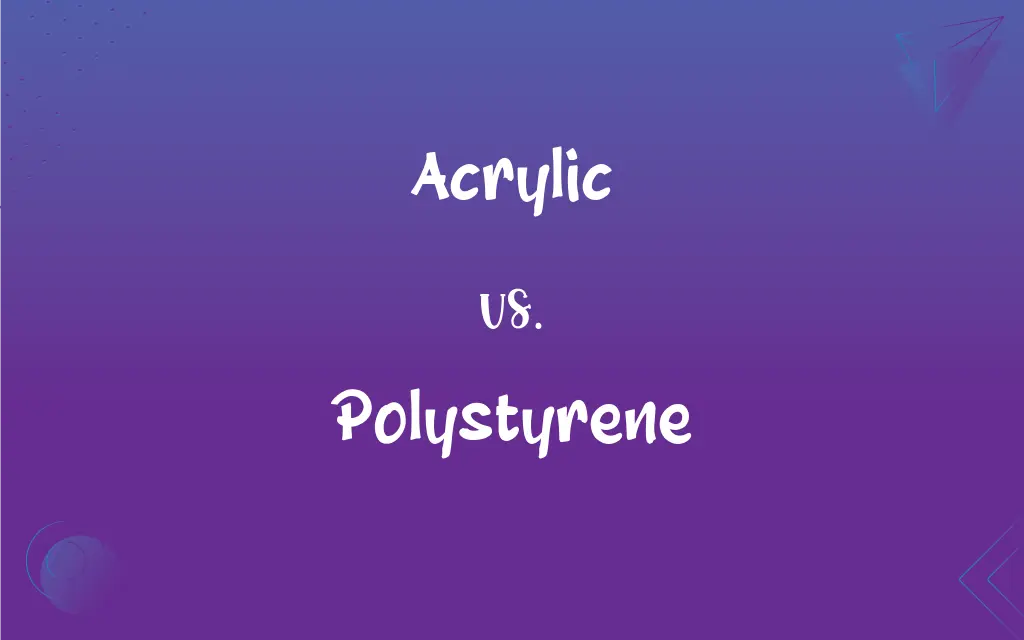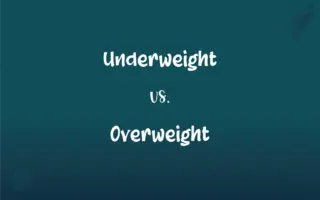Acrylic vs. Polystyrene: What's the Difference?
Edited by Janet White || By Harlon Moss || Updated on November 2, 2023
Acrylic is a transparent plastic material with outstanding strength and optical clarity, while polystyrene is a lightweight, typically non-transparent thermoplastic used in a variety of applications.

Key Differences
Acrylic, known as polymethyl methacrylate (PMMA), offers excellent optical clarity and is often used as a glass alternative. Polystyrene, a petroleum-based plastic, is less clear and often used in the production of disposable consumer goods.
Acrylic sheets are valued for their durability and resistance to impact, making them suitable for windows, screens, and aquariums. Polystyrene, on the other hand, is more brittle and prone to cracking under stress.
The thermal insulation properties of polystyrene make it ideal for use in packaging and insulation. Acrylic, however, has a higher resistance to UV light and weathering, which is why it's preferred for outdoor applications.
In terms of fabrication, acrylic can be easily cut, shaped, and bonded with adhesives and solvents. Polystyrene can also be molded into various forms, but it is less versatile when it comes to bonding techniques.
Acrylic is generally more expensive than polystyrene due to its superior properties and the more complex manufacturing process. Polystyrene is a more cost-effective option for many everyday products due to its ease of production and lower material cost.
ADVERTISEMENT
Comparison Chart
Transparency
Highly transparent
Often opaque or translucent
Impact Resistance
More resistant to impact
Brittle and less impact-resistant
UV Resistance
High resistance to UV and weathering
Less resistant to UV and can degrade in sunlight
Insulation
Not typically used for insulation
Commonly used for thermal insulation
Cost
More expensive
Less expensive
ADVERTISEMENT
Acrylic and Polystyrene Definitions
Acrylic
Paint medium.
The artist chose acrylic for its quick-drying properties.
Polystyrene
Thermoplastic nature.
Polystyrene is widely used in model-making.
Acrylic
Synthetic material.
Acrylic is used to make various craft items.
Polystyrene
Food service use.
We received our takeaway in polystyrene containers.
Acrylic
Dentistry use.
Acrylic resins are used in making dentures.
Polystyrene
Packaging material.
The product was protected by a polystyrene foam casing.
Acrylic
Fabric fiber.
Her sweater was made of soft, warm acrylic yarn.
Polystyrene
Insulation application.
Polystyrene boards are common in home insulation.
Acrylic
Glass alternative.
Acrylic panels were installed in the greenhouse.
Polystyrene
Manufacturing pellets.
Expanded polystyrene beads are used in bean bags.
Acrylic
An acrylic resin.
Polystyrene
A rigid clear thermoplastic polymer of styrene that can be molded into objects or made into a foam that is used as thermal insulation.
Acrylic
A paint containing acrylic resin.
Polystyrene
(organic chemistry) A vinylic polymer of styrene, CH2CHphenyl.
Acrylic
A painting done in acrylic resin.
Polystyrene
(organic chemistry) An alkane chain of benzene molecules, RCH2CHphenylR.
Polystyrene
A polymer of styrene; a rigid transparent thermoplastic;
Expanded polystyrene looks like a rigid white foam and is used as packing or insulation
FAQs
Is acrylic more durable than polystyrene?
Yes, acrylic is generally more impact-resistant and durable.
What is acrylic commonly used for?
It's used for items like aquariums, signs, and protective barriers.
Can polystyrene be recycled?
Yes, though its recycling is less common than other plastics.
Are acrylic items expensive?
They can be, due to the material’s superior qualities and production costs.
How does sunlight affect polystyrene?
Sunlight can degrade polystyrene over time.
What are the main characteristics of polystyrene?
It's lightweight, easily moldable, and often used for insulation.
Why is acrylic preferred for outdoor applications?
Its resistance to UV light and weathering makes it suitable for outdoors.
What are the disadvantages of polystyrene?
Its brittleness and environmental impact are considered disadvantages.
Can acrylic be used in place of glass?
Yes, it's often used as a shatterproof alternative to glass.
How is polystyrene typically formed into products?
Through processes like injection molding and extrusion.
Can you use acrylic as insulation?
It's not typically used for insulation due to its cost and properties.
Is polystyrene harmful to the environment?
It can be, especially if not disposed of or recycled properly.
Is acrylic a type of plastic?
Yes, it's a type of thermoplastic.
Are acrylic products scratch-resistant?
They are more scratch-resistant than polystyrene but can still be scratched.
What is expanded polystyrene?
It's a foam version of polystyrene, used for cushioning or insulation.
Can acrylic be molded?
Yes, it can be thermoformed into different shapes.
Is polystyrene flammable?
It can be flammable and is often treated with flame retardants.
How do you clean acrylic surfaces?
With soapy water and a soft cloth; avoiding abrasives.
Why is polystyrene often used for disposable items?
Because it's cheap to produce and lightweight.
What makes polystyrene suitable for packaging?
Its cushioning effect and thermal insulation properties.
About Author
Written by
Harlon MossHarlon is a seasoned quality moderator and accomplished content writer for Difference Wiki. An alumnus of the prestigious University of California, he earned his degree in Computer Science. Leveraging his academic background, Harlon brings a meticulous and informed perspective to his work, ensuring content accuracy and excellence.
Edited by
Janet WhiteJanet White has been an esteemed writer and blogger for Difference Wiki. Holding a Master's degree in Science and Medical Journalism from the prestigious Boston University, she has consistently demonstrated her expertise and passion for her field. When she's not immersed in her work, Janet relishes her time exercising, delving into a good book, and cherishing moments with friends and family.































































